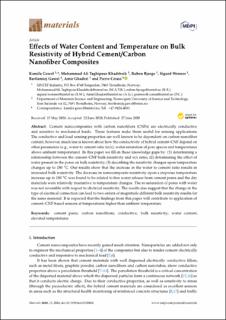Effects of Water Content and Temperature on Bulk Resistivity of Hybrid Cement/Carbon Nanofiber Composites
Gawel, Kamila; Taghipour, Ali; Bjørge, Ruben; Wenner, Sigurd; Gawel, Bartlomiej; Ghaderi, Amir; Cerasi, Pierre
Peer reviewed, Journal article
Published version

Åpne
Permanent lenke
https://hdl.handle.net/11250/2676684Utgivelsesdato
2020Metadata
Vis full innførselSamlinger
- Institutt for materialteknologi [2555]
- Publikasjoner fra CRIStin - NTNU [38576]
Sammendrag
Cement nanocomposites with carbon nanofibers (CNFs) are electrically conductive and sensitive to mechanical loads. These features make them useful for sensing applications. The conductive and load sensing properties are well known to be dependent on carbon nanofiber content; however, much less is known about how the conductivity of hybrid cement–CNF depend on other parameters (e.g., water to cement ratio (w/c), water saturation of pore spaces and temperatures above ambient temperature). In this paper we fill-in these knowledge gaps by: (1) determining a relationship between the cement–CNF bulk resistivity and w/c ratio; (2) determining the effect of water present in the pores on bulk resistivity; (3) describing the resistivity changes upon temperature changes up to 180 ◦C. Our results show that the increase in the water to cement ratio results in increased bulk resistivity. The decrease in nanocomposite resistivity upon a stepwise temperature increase up to 180 ◦C was found to be related to free water release from cement pores and the dry materials were relatively insensitive to temperature changes. The re-saturation of pores with water was not reversible with respect to electrical resistivity. The results also suggest that the change in the type of electrical connection can lead to two orders of magnitude different bulk resistivity results for the same material. It is expected that the findings from this paper will contribute to application of cement–CNF-based sensors at temperatures higher than ambient temperature
